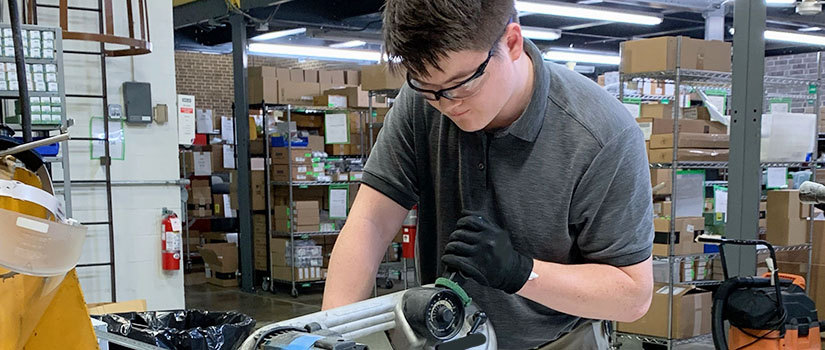Most students try to avoid delaying their graduation, but for chemical engineering junior Sean Budke, trading an extra year of studies for a cooperative education program (co-op) was too good to pass up.
Budke’s passion for math and natural science from a young age made chemical engineering an easy choice for his undergraduate studies. The Long Island, New York native immediately fell in love with the University of South Carolina’s campus when he visited Columbia for his cousin’s wedding. But even temporarily leaving USC had its benefits. Budke recently finished a yearlong co-op at Charlotte-based engineering firm R.E. Mason, where he discovered his passion for control systems.
R.E. Mason provides a variety of products and services to manufacturers in industries like pulp and paper, chemical, metals and mining, and consumer products. Budke’s position with the automation engineering team allowed him to work with process control systems, including the devices, networks and controls used to operate and automate industrial processes.
“Under their guidance, I configured complicated graphics, taught a DeltaV [automation software] class to customers, assisted operators on different chemical plant sites and more,” Budke says. “I also developed code to improve efficiency and simplify tedious tasks.”
According to Budke, two positive influences during his first year at USC led him to the co-op position. The first was Christopher Williams, undergraduate director for the Department of Chemical Engineering, who Budke spoke with during Admitted Student Day, and assisted him in finalizing his choice of major. Budke also said that one of Williams courses helped him learn the fundamentals and better understand chemical engineering.
As a freshman, Budke took a course, “Exploring the Chemical Engineering Workplace,” which helped him develop a resume, learn interviewing skills and begin to network for his future career. As part of the course, Budke was required to attend the university’s STEM Career and Internship Fair, where he had his first contact with R.E. Mason. While not specifically looking for an internship at the time, he was intrigued by a demonstration given by the company. Budke returned to the career fair the following semester and received an interview for the co-op position.
R.E. Mason’s co-op program spans longer than both the traditional single-semester internship and two-semester co-op. “Internships tend to be relatively short, so you don’t have much time to apply the skills, and employers may tend to give you more tedious tasks,” Budke says. “Since we [the cohort] were working at R.E. Mason for an entire year, we were treated just like any other employee.”
Budke started receiving his own projects after only about a month at R.E. Mason. “It was quite early, so I wasn’t expecting it. We could still go to our coworkers for help but to be given that responsibility was great. It was awesome to be able to apply my own ideas because that’s the best way to learn,” Budke says.
Another advantage of R.E. Mason’s yearlong program is that Budke had the opportunity to become fully integrated into his team. “The company has a great working environment which made it very easy to apply your own ideas to make our projects more efficient,” Budke says. “It was great being able to work with a team that you know is going to work just as hard as you.”
Reflecting on the co-op experience, Budke says his confidence in his chosen path has grown.
“I look back on the experience very positively and feel like I’ve developed a lot of skills using different programs such as Excel, DeltaV and Python,” Budke says. “When I returned to USC, I was able to apply many of those skills in my classes.”
